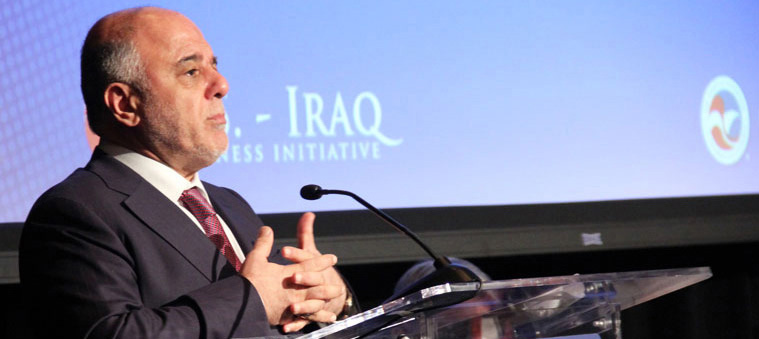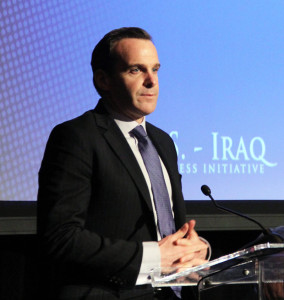
Iraq’s Prime Minister Haider al-Abadi stressed the importance of maintaining a continual relationship between Iraq and the U.S. (Ramsen Shamon/MEDILL)
WASHINGTON—Iraqi Prime Minister Haider al-Abadi stressed the importance of maintaining a relationship between the United States and Iraqi governments at a pro-business reception on Thursday.
“If we are partners, we should keep that partnership. It’s important. It’s vital. Partners must trust each other,” Al-Haider said.
The prime minister, speaking at an event hosted by the U.S. Chamber of Commerce, emphasized his government’s willingness to deviate from the policies of previous administrations.
“If we make things transparent, and if we remove the red tape, you can shrink corruption by a huge amount,” he said.
Al-Haider outlined policy changes that he said will create a better relationship between the public and the private sectors.
“We have started easing visa requirements. A lot of investors now will find it much easier [to enter the country]. We want to make it quite easy for investors to come to Iraq, and truly invest,” he said. “We are introducing taxes. We are asking [the Iraqi]
people to pay for services. The government has to find funds to sustain the war. We cannot continue with free services, with free allocations. We have to make people pay for it. This is a new culture. It’s not easy.”
Brett McGurk, deputy assistant secretary for Iraq and Iran in the Bureau of Near Eastern Affairs, applauded the prime minister’s “inclusive” government.

Brett McGurk, deputy assistant secretary for Iraq and Iran, applauded al-Abadi for his efforts against the Islamic State. (Ramsen Shamon/MEDILL)
“He has led the country through significant political reforms and very difficult economic reforms. Despite the difficult year Iraq has had, Iraq is now on track to have record-level oil exports. [He]
has instituted significant reforms on subsidies that are necessary for metro-economic stability. U.S. exports to Iraq have actually risen over the last year. It is a remarkable moment of potential for Iraq,” he said.
Khush Choksy, Chamber of Commerce vice president for Middle East affairs, spoke to the audience about investing in Iraq.
“The mission of the chamber’s U.S. – Iraq program is to increase access by American companies to Iraq’s markets, help expand American investment in Iraq, and to promote dialogue with leaders in the United States and the government of Iraq,” Choksy said.
Retired Iraqi Army Brigadier General Ismael H. Alsodani, also a defense attaché for the Embassy of Iraq in D.C., was “very optimistic” about what he heard from al-Abadi.
“I believe Iraq will be recovering, the economy will be recovering,” Alsodani said. “This is the first time I’ve heard from a prime minister of Iraq [about]
his vision for the future. He will be the man of the age in Iraq.”
Attendee Robert Lindgren, principal of Perkins + Will, was also optimistic.
Lindgren said his architecture and design firm plan to build more universities in Iraq. They have built the now-functioning American University in Sulaymaniyah.
“We do business in Iraq and we do see [corruption], and it’s certainly going to be difficult to deal with, but I think the fact that he’s acknowledging that and trying to deal with that is very important,” Lindgren said. “Projects like universities are ‘A,’ very important for a country like Iraq. And ‘B,’ those are the kinds of things that will help create a civil society…and [help people]
learn how to work together and live together.”






